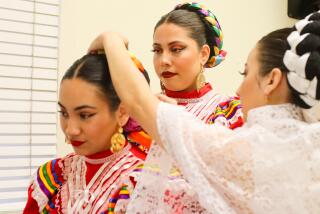HIGH LIFE : Getting to Know You : Exchange Students Discover Wonder, New Friends and the Opportunity to Grow Both Here and Abroad
- Share via
D ear Chris,
At this point you have returned from Switzerland and you’re just now remembering that before you left home you wrote this letter to yourself. Kind of a shocker to read about all the things you set out to do when you became an exchange student, isn’t it?
For example, you wanted to:
Come back with a new perspective about people, your place in the world, friendships and just maybe the meaning of life.
Learn as much French and German as possible.
Develop lifelong relationships with your host family and other Swiss people.
Most of all, develop your personality to be the most caring, unique, good person you can be. On the same note, try to make your relationship with God grow.
Enjoy.
Hope you accomplished everything you wanted to.
Signed,
Chris
The ideas expressed in my letter--just one of many activities exchange programs use to help prepare future international students for their journeys--are pretty universal.
Every year, thousands of teen-agers around the globe, seeking to learn more about their world and themselves, opt to become exchange students as I did last summer. The effects can be stunning.
“When I came back home, it seemed like everything had changed, but I guess it was me that had changed,” said Maria Sandstrum, a high school student from Somis, Calif., who spent last summer in Switzerland.
Preconceptions of foreign countries are often shattered the first week or two of living in those countries. Just as foreigners to the United States find out how different this country is from its depiction on TV shows such as “Dynasty,” “Dallas” and “Miami Vice” (shown throughout Europe), so too are American students’ preconceptions withered within their first few days of foreign residence.
Ariane Fletcher, 18, of Newport Beach spent a year in Switzerland. He left home with the vague expectation of living in a Swiss mountain chalet, but when he arrived he found out his home would be a five-story condo in a city larger than his hometown.
Macarena Gomez, a Spanish exchange student attending Dana Hills High School in Dana Point, was pleasantly surprised to learn about a custom practiced here but not in her home country.
“I was at McDonald’s with my friend and these guys walked up to me and asked me for my phone number,” she said, laughingly adding that she learned even more about American boys when they failed to call.
These initial adjustments are just part of the learning process for exchange students, who also are faced with tackling a foreign language--or two or three, as was the case with Fletcher.
While vacationing in Italy with his German-speaking host family, he found himself at the dinner table “trying to communicate in English and broken German with my host family, in French to a Swiss friend of the family and in Italian to the family that had invited us to dinner.”
Rosanna Pensiero of Arizona, another American exchange student who spent a summer in Switzerland, found it both amusing and confusing one evening as she watched TV and saw “The Brady Bunch” translated into French, “Dallas” into German and “Who’s the Boss” into Italian.
But the language barrier is just one of many challenges.
Leaving behind old friends and making new ones can be traumatic. Yet by the time they head for home, most exchange students remember their new-found friendships as the most rewarding part of their trips.
“It’s hard getting to know people right away,” said Julie Morton, 17, a senior at Dana Hills and former exchange student to Sweden. “You start thinking about your friends at home. I started to get a little bit homesick, but I realized pretty quick that all my new friends were there for me.”
It also can take some time for the closeness between the host family and the exchange student to develop.
“At first, it’s very strange because you don’t know your new family like your own family,” said Masimiliano (Max) Fabani, an exchange student from Italy who spent last summer in San Juan Capistrano. “After two weeks (in the United States), I felt at home.”
This eventual sense of belonging is echoed by many.
“By the end of the year, I really felt like an American,” said Jeanine Brandenbergaer, a student from Switzerland who spent a year in Jacksonville, Fla. “I had a second home and second parents who I loved very much and still do.”
Along with friends and family, the students also remember favorite places in their host cities.
Italian Francesco Erba, an 18-year-old summer exchange student to San Juan Capistrano, recalled the sense of belonging he felt when he played basketball at Laguna Beach’s Main Beach.
“I liked the ‘hey-man-give-me-five’ feeling. . . . it gave me an opportunity to meet so many people,” he said.
Every exchange student has, no doubt, his or her own list of unforgettable experiences and unanswerable questions from their stays. Examples include:
“Why do you want to put pineapple on your pizza?”
An Italian student in California
“Why does everyone have to run to class?”
A Spanish student at Dana Hills
“Do you seriously not have a dishwasher because it wastes too much energy?”
An American in energy-conscious Switzerland
“Are you telling me that this girl asked me out but expects me to pay for the entire date?”
A Norwegian student at Dana Hills
“You mean you don’t want to wear shoes?”
An Italian student to American friends in Dana Point
“Where am I?”
A Lost American student in Switzerland
“There are so many new experiences, you can’t help having a good time,” Fletcher said. “As long as you are willing to try, so are the people around you.”
Which bring up the questions: What if you’re not willing to try and you’re not open-minded?
Pensiero faced these problems early on in her stay in Switzerland. Feeling uncomfortable with her host family and knowing no one else, she stayed in her room most of the time, writing letters to friends back home.
“I wasted my first three weeks,” she said. “I finally realized the only way anything was going to happen was if I got out and started doing things, and from then on I had a fabulous time.”
When Morton began to miss the closeness and affection of her real family, she tried the honest approach with her host Swedish family.
“I finally just went up to them and said, ‘I’m not leaving this house until I get some hugs.’ ”
No problem.
Erba, a veteran exchange student who has lived in England, South Africa and the United States, advised future students to throw away all expectations.
“I expected that all I’d want to do when I got to Italy was shop,” said Julie Coontz, a senior at Dana Hills who spent a month in Sondrio, Italy. “But once I got there, I found myself just wanting to absorb the culture and the people. I just wanted to learn about Italy and Italians.”
More advice: Go it alone.
Erba and Fabani, who traveled together and stayed with three different families over a five-week period in San Juan Capistrano, agreed that while their own friendship deepened, it was hard to absorb American culture and learn English when there was constantly someone around who spoke Italian.
In addition, both students said they would have preferred to spend the entire time with one family rather than three and would have liked to have stayed longer.
“You don’t get a taste of everyday life in just a few weeks with a family,” Fabani said. “In that short of a time, people treat you differently. It’s more like a vacation.
The proper age to take advantage of an exchange program? According to Erba, 16 or 17 because you’re still young but you’re old enough to have a pretty good understanding of what’s going on in the world.
And even if you have a pretty good idea of what life is about already, be prepared to learn a great deal that you never expected.
“Even common, everyday things are a new experience,” Coontz said.
Said Fletcher: “Everyone in my (host) family had a career of some sort, but each one also had a hobby that they spent a lot of time with. My host father liked to draw pictures, and the house was covered with them. Anita loved to dance, Jeanine played the guitar and Oli played the drums. It made me think that maybe success isn’t so important as long as you’re happy.”
Fabani said he learned that all of America isn’t what he has seen at the movies.
“You see people homeless and hungry and then drive 15 minutes and see Beverly Hills,” he said. “I can’t understand these two extremes.”
Sometimes the exchange experience changes students’ perspectives of their own countries.
“I realized just how inhibited Americans really are,” Coontz said after returning from Italy.
Said Fletcher: “Once you’ve spent time in such a peaceful country as Switzerland, it’s hard to relate to the whole success-oriented American work ethic. It’s hard to go from cows to Beamers (BMWs).”
Often, the most important lesson is the biggest paradox of all.
“I understand now that all over the world life is the same,” Fabani said. “There are differences between East and West, Italy and America, but not really, not when you get to know the people.
“Being an exchange student helps you realize that,” he said. “It helps you for your life, it helps you for your future.”
About those goals outlined in the letter I wrote myself . . . no problem.






